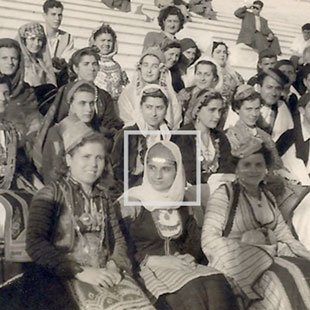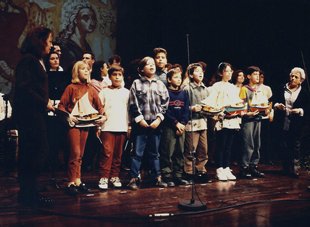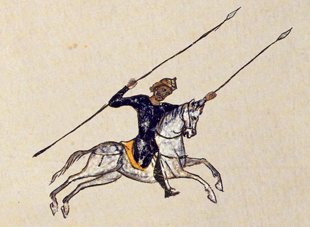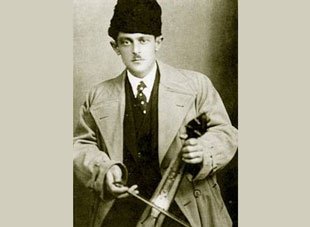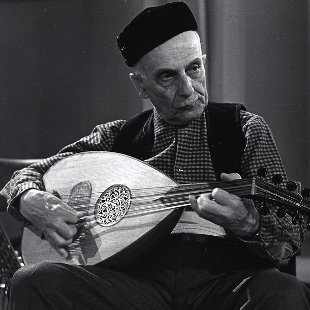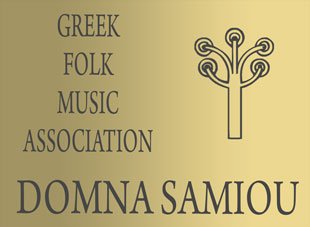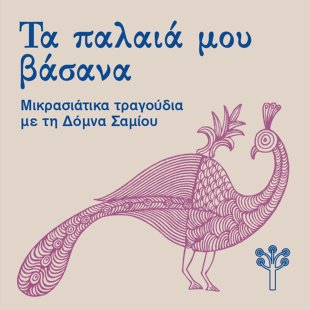You are at: Home page Her Work List of Songs How beautiful our bride
Όμορφη που ‘ν’ η νύφη μας
Listen
Lyrics
Our bride is beautiful and I've no need of words
Her sweet cheeks are red as roses.
I'm telling you so hear my words
Take joy and pride in them.
Don't pinch your pennies, groom, make a little cage
And put our bride in there, who's not yet of age.
Slap me hard with your hand
Go fetch a wedding band.
Best man, who joined the cypresses with wedding crowns
May God make you worthy to buy the christening gowns.
I’m singing this song to you, it’s ours
So whack me with the flowers.
Translated by Michael Eleftheriou
Original Lyrics
Όμορφη που ‘ν’ η νύφη μας
Ταραϊτά, ταραϊρά, ταρατα…
Όμορφη που ‘ν’ η νύφη μας κι εγώ δεν θέλω λόγια,
-ωχ, κι εγώ δεν θέλω λόγια-
κι είναι τα μαγουλάκια της κόκκινα σαν τα ρόδα
-ωχ, κόκκινα σαν τα ρόδα.
Άντε, σε τα λέγω κι άκουγέ τα,
χαίρου και καμάρωνέ τα.
Γαμπρέ, μη λυπηθείς φλουριά και κάν’ ένα κλουβάκι
και βάλε τη νυφούλα μας, που ’ναι κοπελουδάκι.
Άντε, μαστραπά* μου με το χέρι,
τό ’βρες το δικό σου ταίρι.
Κουμπάρε, που στεφάνωσες τα δύο κυπαρίσσια,
να σ’ αξιώσει ο Θεός να ’ρθείς και στα βαφτίσια.
Άντε, σέν’ τα λέγω τα τραγούδια,
μαστραπά με τα λουλούδια.
* Μαστραπάς: πολυτελές κανάτι από μέταλλο, πορσελάνη ή γυαλί (τουρκ. maşrapa)
Information
- Region: Asia Minor
- Area: Erythraea, Kato Panagia
- Categories: Wedding Song
- Rhythm: 4 beats
- Duration: 03:18
Collaborators
- Singer: Domna Samiou
- Tambourine: Domna Samiou
Albums
Notes
In Erythraea, Asia Minor, the wedding blessings / praises were mainly sung by women, with pride of place given to a woman who was sweet of voice and could recall an abundance of couplets, improvised or long-formulated, from the limitless repository of a given Erythraean community (here, the villagers of Kato Panagia, which was renowned for the number and range of its songs), accompanied by the goblet drum (toumbeleki), the “dava” (a frying pan), or the tambourine (defi), should no other instruments be at hand. The wedding songs stand out for their lyricism, poetic imagination and grace, being full of allegories, metaphors, similes and imagery. These are the songs sung at every stage of the wedding, from the dowry display through to the bathing of the bride, the shaving of the groom, and the dressing of them both. With these songs, the community compliments and praises, conveys its tips and heart-felt advice, its blessings and good wishes to the young couple, the family-unit-to-be that is being added to the local community. But these 'songs of praise’ weren't sung only for the bride and groom: their parents and parents-in-law, best men and women, even their guests, would also be honoured with couplets of praise. And it was to still more couplets, though set to different rhythms (syrtos, ballos and karsilamas) that the newly-weds and their guests would dance, once the rite was completed, at the wedding feast.
In this song from Kato Panagia, the fifteen-syllable couplets praise the beauty of the bride, urge the groom to take good care of her, wish long life to the bride and groom, and look forward to the best man and woman assuming their related roles as godfather and godmother to the couple's first-born child. The eight-syllable choruses urge the bride with epigrammatic poetic brevity to heed the songs’ words and rejoice in her wedding.
Addressing the trialala, lalala… repeated after the verse in a host of Erythraean songs, Simon Karas aptly notes in his comments on a ballos from Reisdere (a village close to Kato Panagia) on the album Songs from Mytilene and Asia Minor (SDNM 125, B5), that “A characteristic feature here is the sung gyrisma “Trialarela, rela, relala", a vocal imitation of instrumental timbres similar to that achieved in ecclesiastical music through the use of drones."
A similar song, also from Kato Panagia, entitled Ποιος ήταν ο προξενητής (Who was the matchmaker?, Poios itan o proxenitis) is included on the album from the Lyceum Club of Greek Women Songs and dances from Smyrna and Erythraea, Asia Minor (LCGW 113, B4).
Theodor Kondaras (2022)
Recording information
Live recording from the concert Songs of Asia Minor with Domna Samiou at the Megaron, the Athens Concert Hall, on 8/3/2005.
The song was recorded by Domna Samiou in Kato Panagia, Kyllini, Ilia with refugees from Kato Panagia Erythraea, Asia Minor, in July 1978.
Member Comments
Post a comment
See also
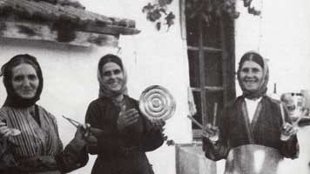
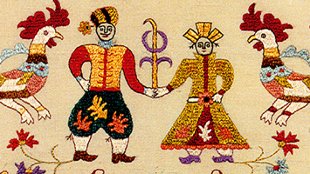

Song
At Dawn

Song
Ballos from Alatsata

Song
Dimitroula
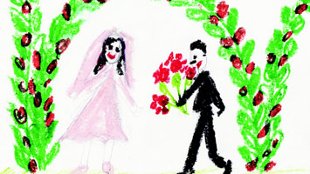
Song
I Climbed up the Cherry-Tree


Song
Roumbalia


Song
The Water of Life

Song
The Widow

Song
The Young Meliots

Song
Yatzilariani

Song
Yio Mario


